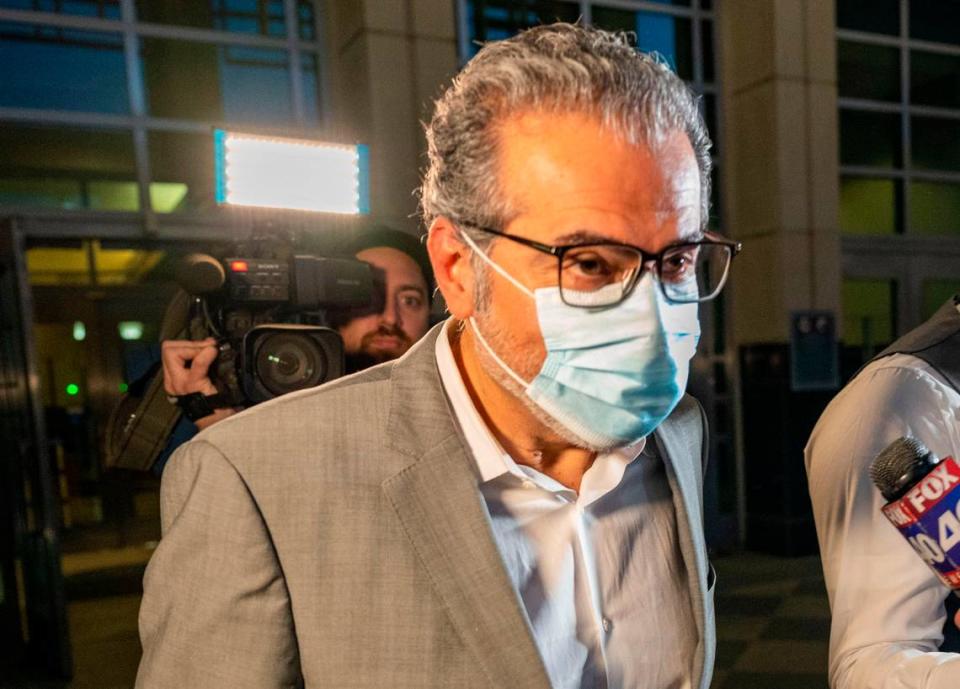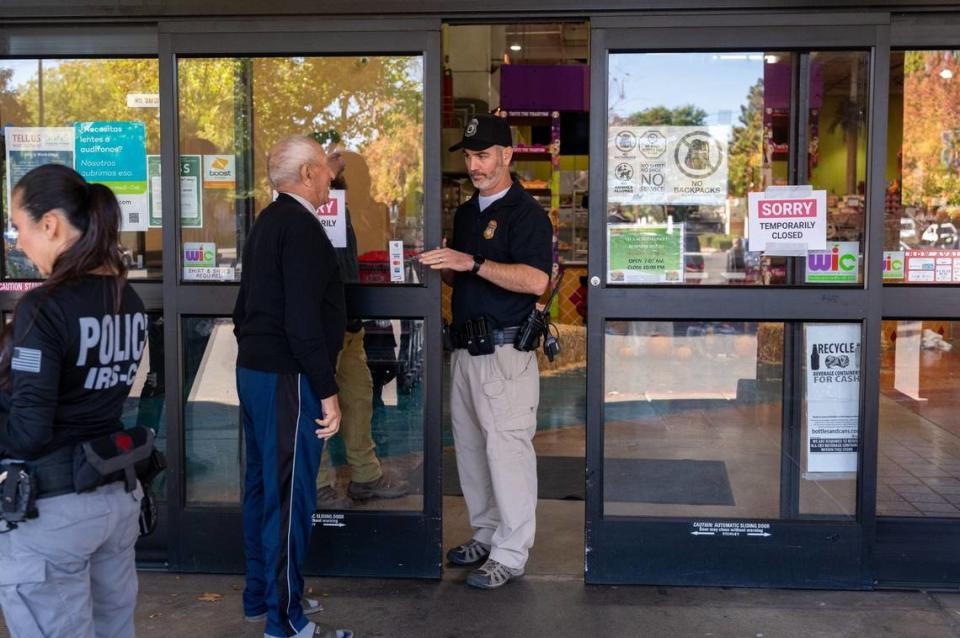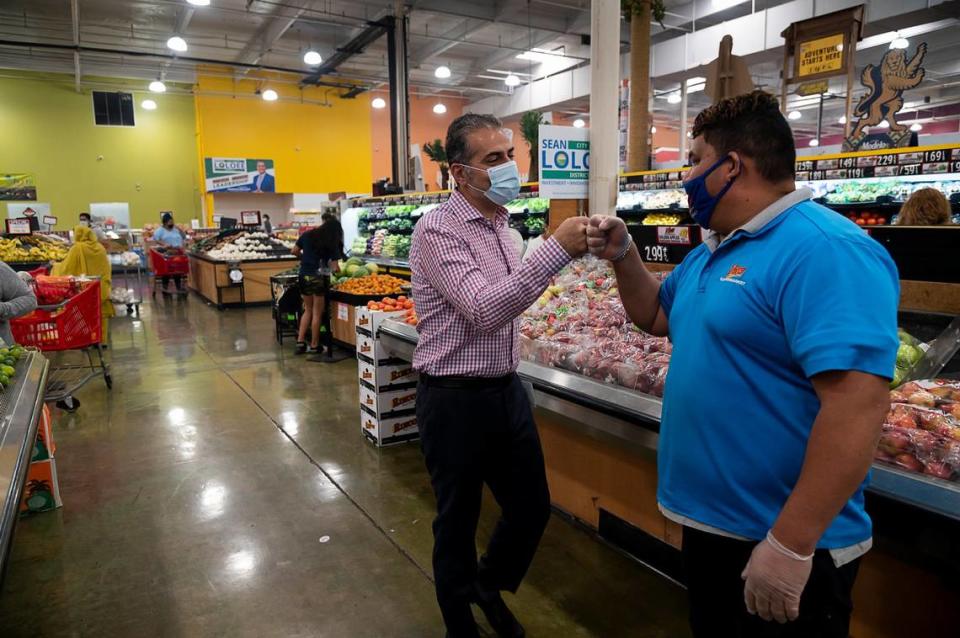Viva Supermarket employees speak out against former councilman Sean Loloee, grocery stores
The man, in his mid-40s, stood in the driveway of his North Sacramento residence, less than four miles from a Viva Supermarket store where he spent seven years working.
He spoke in low tones, fearing what details of the hour-long conversation could be linked back to him.
He had limited his conversations with coworkers during his years in the store. He’s ignored repeated requests from the federal Department of Labor, even with the promises of confidentiality. He had even ignored the chatter about nonprofit organizations helping workers.
But now he was among the few who were ready to speak out.
Many said they faced veiled threats of deportation. Some alleged they were asked to deposit checks into their personal accounts and return the money to their employer. A few said they were told to lie about their workplace injuries. And others said they faced sexual harassment.
These stories, recounted by former Viva Supermarket employees, provide some of the first details behind the 25-count indictment charges facing former Sacramento City Councilman Sean Loloee and his general manager Karla Montoya for all the stores.
Among the charges, the indictment alleges the pair maintained a workforce of undocumented employees at four supermarkets in North Sacramento, Del Paso Heights, Rancho Cordova and Dixon because they were “easier to control.”

The Sacramento Bee reached out to nearly 60 former and current workers to corroborate the allegations. The majority declined interviews or did not respond to repeated requests for comment.
Four former employees, ranging in age from 26 to 51, agreed to speak on the condition of anonymity, fearing potential retaliation from Loloee, Montoya or their associates with ties to the state of Michoacán, Mexico — an area fraught with ongoing violent attacks and organized crime activity.
“The majority (of former employees) have fear. They don’t want to get involved in this,” said one undocumented former employee who worked at the Norwood Avenue store for seven years. He estimated about 80% of their fellow employees were from Michoacán.
Two former workers, who are undocumented, confirmed nearly all of the federal allegations. They described a culture of intimidation and favoritism, in which employees were treated differently depending on their immigration status and relationship with store leadership.
The two workers outlined several types of discrimination often faced by undocumented employees including threats of immigration enforcement, wage theft and the avoidance of legal responsibility for workplace injuries.
The other two workers, who had citizenship status, recalled no issues with Loloee or Montoya, but said the store lacked oversight which led to abuses of power by supervisors and tension among employees. One of the workers, who worked in the bakery department at the Norwood Avenue store in 2020, the year Loloee was elected to council, said she faced sexual harassment from her direct supervisor and intimidation from coworkers.
“My life got a lot better after I left Viva,” said the 26-year-old woman.
Loloee, through a spokesperson, declined an interview after The Bee did not agree to share the names of the four workers. In emailed statements later sent by his attorney Tom Johnson, Loloee denied the allegations detailed in this story and declined further comment due to the ongoing federal case.
“As is true in all workplaces, some people feel undervalued and unappreciated, that does not mean Mr. Loloee committed any crimes,” Johnson wrote in an email. “Mr. Loloee is not guilty, he is presumed innocent, and looks forward to his day in court.”
Montoya, through her attorney Bill Portanova, declined an interview and provided a written statement.
“Ms. Montoya interacts daily with hundreds of customers, vendors, and employees in an exemplary manner and has done so for fifteen years,” wrote Portanova. “That is all there is to it. The allegations against her from a handful of disgruntled employees are wrong and will be proven so at trial.”
‘Everyone turned their heads’
On a morning in late 2018, Loloee gathered employees at the Norwood location for a team meeting, the two undocumented workers recounted. Like most store-wide meetings, general manager Montoya served as the translator for the mostly Spanish-speaking employees.
But even with their limited English, the two workers could discern Loloee’s anger, or what they both described as “aggressiveness,” by his demeanor.
“When he (Loloee) gets mad, he completely changes,” said a former undocumented employee. “He is not the same person.”

The meeting was called to discuss a lawsuit filed in October of that year against Loloee’s companies in Sacramento Superior Court by two former grocery store employees. They claimed they were not paid overtime, were not given meal or rest periods and other allegations.
Loloee claimed they were lying.
Former workers recalled Loloee saying anyone who supported the lawsuit should not work at his company and was betraying him. They said the former councilman warned workers he had employed lawyers, had knowledge of labor law, he was well connected in Sacramento, and anyone who sues him would receive “zero pennies.”
“Everyone turned their heads, the moment he (Loloee) said that he had friends who were immigration officials,” said one of the former undocumented workers.
These veiled threats are not a new tactic, said Victor Narro, project director for the UCLA Labor Center and a national expert on immigrant rights. He said threats of deportation are the most frequent workplace discrimination endured by undocumented workers.
“That creates the fear and it makes the workers afraid to report violations or to begin to organize against working conditions,” Narro said.
Loloee eventually paid a settlement to the two workers for that 2018 case, court records show.
‘Standing operating procedure’
The two undocumented workers also corroborated many of the other allegations in the federal indictment.
During certain time frames, some undocumented workers were paid under the table in cash which left out overtime pay. eventually, the stores under Loloee transitioned to check payments but required some employees to cash out at the Western Union offices inside the Viva Supermarkets, where they faced a surcharge.
“Sometimes, necessity makes you allow a lot of things to happen,” said a former undocumented worker.
The two former undocumented workers stood by the allegation that Loloee tried to coerce employees to return the back wages after a follow-up federal investigation deemed Loloee had violated overtime and record-keeping requirements at the grocery stores.

One undocumented worker recalled a one-on-one meeting with Loloee, in which she was told beforehand not to bring a cellphone to record the conversation. Through a translator, she said, Loloee explained that he was being investigated, so he needed her to sign a paper and take a check.
Loloee asked her to deposit the check into her bank account, withdraw the cash and return it to him, she said. He argued that he had paid her the overtime and the money was his.
The woman said she was initially confused, and refused to take the check.
Loloee became angry, she said, and the two went back and forth until she left the room crying, with the check. At one point during the conversation, she recalled Loloee saying she would not receive any more money if she tried to sue.
The employee was later reassured by a fellow worker who said Loloee was trying to intimidate workers into returning the money. That money was owed to her, the coworker told her.
“How are we going to give back something that isn’t his?” she recalled her coworker saying.
The two undocumented workers also described at least two times in which they personally saw a worker hurt on the job, who was then told by Loloee to lie about the injury.
In one instance, a worker cut his hand while slicing meat and in another a woman who fell on the job.
Both times, the workers said, Loloee told the injured employees to go to the hospital and say the accident happened at home. He offered to pay any medical costs later.
But that wasn’t always true. They both knew of at least one worker who received no money.
“That was standing operating procedure,” said Maria Grijalva, owner of the Latino Info Resource Center.
Grijalva, a labor rights activist, has worked closely with Loloee’s former employees. She said many workers, with a lack of citizenship status and not officially on the payroll, were left without many options. Grijalva has been in contact with former workers since 2018 and advocating on their behalf.
‘My manager was a creep’
Problems at the store were not only linked to Loloee and Montoya.
Two former female workers, who had citizenship status, said their issues stemmed from their direct supervisor. Both women said they tried to keep mostly quiet, but coworkers discussed their issues with Loloee and ongoing lawsuits. Neither could speak personally about the experiences of undocumented employees.
“I think one of the reasons that I feel comfortable enough speaking up is because I’m a U.S. citizen,” said one of the workers, who was employed at the store while in college.
She said, however, she faced continued sexual harassment from her male supervisor. The worker said that Loloee reportedly knew about the supervisor’s behavior, but still employed him.
She said the supervisor extended this behavior to several women working in the department. In her case, the supervisor would remark about her makeup, stand behind her when she picked up boxes and discuss his “sexual fantasies” about her.
“My manager was a creep,” she said. “That’s why I didn’t last.”
This former worker left the store after seven months, returning to her previous, lesser paying job.
“I literally begged my old manager to take me back,” she said.
The second worker with citizenship who spoke to The Bee said she never had issues with Loloee or Montoya, but she said she left the store after eight years citing her over-demanding supervisor. She recalled instances where she was yelled at and treated like “trash.” She believed store leadership needed to have more oversight over each supervisor and their department.
“They need to pay more attention to how the supervisors treat their employees,” said the worker.
‘It’s another way to make you afraid’
The fear dynamic at the Viva grocery stores was intensified by ongoing violence thousands of miles away in Michoacán, a state in southwestern Mexico.
The Mexican state has recorded more than 10,000 murders since December 2018. And in 2021, Zamora, a city in northwestern Michoacán, was deemed the most violent city in the world, according to a report from the Citizen Council for Public Security and Criminal Justice, a Mexican non-governmental organization.
Montoya, whose lawyer confirmed she is from Michoacán, would reportedly recruit grocery store workers from her hometown, the workers alleged. This created loyalty and an environment in which some employees would serve as “spies” for Montoya and Loloee, said one undocumented worker.
“They’re going to say they treated us well,” said that undocumented worker. “They say this is all politics.”
Montoya and Loloee notably have a close relationship. The Bee has previously reported that Montoya lived in a home owned by Loloee and where he claimed to live. Loloee is now on a court order to live at his wife’s house in Granite Bay, where federal investigators determined is his primary residence.
Michoacán’s reputation, according to the three former workers, is the main reason why former employees remain hesitant to talk. They say the area’s notoriety — whether it applies to Viva’s employees — creates trepidation. One former worker said she only felt comfortable for an interview because she was not from Michoacán.
“The fear is that they know where you’re coming from, your hometown and they would find your family members,” Narro said. “It’s another way to make you afraid.”
While in his driveway last month, the undocumented former worker wondered if any information provided for this story would be traced back to him. For years, he had preferred not to risk it. And even now, he admits his ongoing fear of Loloee and Montoya.
Who knows how much power Loloee has in Sacramento and what if the rumors about Montoya’s connections in Michoacán are true, he wondered.
“You don’t know what they’re capable of,” he said.
The Bee’s Theresa Clift and Stephen Hobbs contributed to this story.

